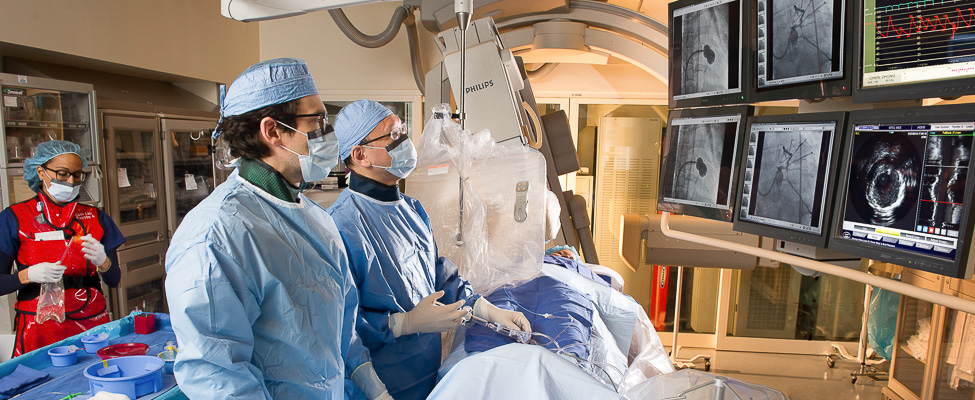
Weill Cornell Medical College offers an advanced training fellowship in interventional cardiology that is accredited by the Accreditation Council for Graduate Medical Education (ACGME). The fellowship consists of one year devoted to intensive training in all aspects of interventional cardiology.
The cardiac catheterization laboratory (“cath lab”) at Weill Cornell is currently made up of five full-time interventional cardiology faculty. The laboratory performs nearly 6,000 total cases and 2,000 percutaneous coronary interventions yearly. Within the division exists a separate heart valve center dedicated to the management of patients with aortic and mitral valve disease.
The cardiac catheterization service maintains a high volume of procedural and clinical practice. The team consists of faculty attendings, a nurse practitioner service, clinical fellows, interventional cardiology fellows, and dedicated nurses, technologists, angioplasty specialists, and research support staff.
Our cath lab faculty considers research to be an integral part of a candidate’s training, and therefore considers past research experience to be an important part of a candidate’s resume.
We recommend that candidates partake in some research endeavor during their general cardiology fellowship. We also recommend that candidates who apply should have had at least 10 months of training within the cath lab during their general cardiology fellowship.
Structure
Rotations
Interventional cardiology fellows will be trained in and perform percutaneous coronary interventions using all currently available technologies, including:
The program places a heavy emphasis on a systematic, evidence-based approach to diagnostic and therapeutic coronary and endovascular procedures.
All fellows will have the opportunity to be proficient at the end of training in:
Each fellow will also have exposure to peripheral interventions, the treatment of patent foramen ovale and atrial septal defect, alcohol septal ablation, and therapeutic options for the transcatheter treatment of valvular heart disease including TAVR procedures.
The program stresses the development of fellows in all areas of interventional cardiology, as each fellow has ample time to develop expertise in pre-procedural as well as post-procedural management of the patient in both the inpatient and outpatient settings.
Specific rotations within the fellowship are:
Research
The laboratory has active clinical research programs, and fellows are expected to participate in projects with the goal of presenting at national meetings and preparing their research for publication in peer-reviewed journals.
Clinical research projects include both prospective (either single-center or multi-center) device and pharmacologic clinical studies and retrospective single-center studies from our own Weill Cornell cardiac catheterization laboratory database or multi-center database from the New York State Angioplasty Registry and the ACC-NCDR Registry. In addition to these areas of research, the laboratory takes part in numerous multicenter clinical trials.
Conferences
Our Faculty
The Interventional Cardiology Faculty include 6 full-time physicians:
Fellowship Program Executive Committee
Instructions to Applicants
Fellows must be enrolled in or have completed a fellowship in cardiovascular disease. Fellows are accepted into the program after three years of cardiology training.
Application Schedule for Fellowship Training Beginning July 1, 2025.
All applicants must submit all the required documents to the program through Electronic Residency Application Service (ERAS).
ERAS Program Code is: 1523512110
A completed application consists of:
Applicants should have substantial research experiences, outstanding letters of recommendation from their clinical and/or research supervisors in the United States and valid ECFMG certification. Though there is no specific board score requirement, a higher score holds greater weight. NewYork-Presbyterian Hospital/Weill Cornell Medical Center sponsors J-1 visas only. H1-B visas are not eligible. You will be responsible for retaining an immigration lawyer and for all associated administrative costs.
Luke Kim, M.D.
Program Director
(212) 746-4789 or luk9003@med.cornell.edu
Zenaya Black
Senior Program Coordinator
(212) 746-8960 or zeb4004@med.cornell.edu